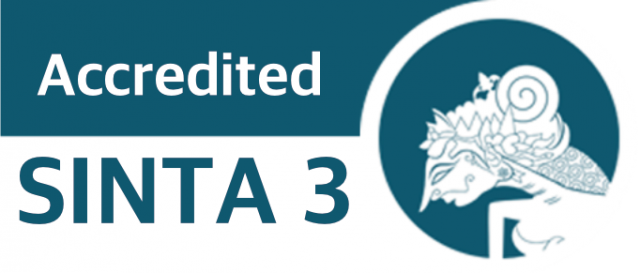Orang Malind dan Tanahnya: Membaca Kebijakan Food Estate Melalui Paradigma Ethnoecology dan Ethnodevelopment
Abstract
Tulisan ini bertujuan menganalisis praktik pengadaan lahan pangan skala luas dalam skema MIFEE di Merauke Papua sebagaimana didokumentasikan dalam film Mama Malind Su Hilang’. Metode yang digunakan adalah kualitatif deskriptif dengan menggunakan pendekatan analisis isi. Praktik pengadaan lahan dan keterpinggiran masyarakat lokal dianalisis dengan menggunakan dua paradigma utama yaitu paradigma etnoekologi dan paradigma etnodevelopment. Kedua paradigma ini digunakan sebagai kerangka analisis karena memiliki benang merah dalam perspektif yang dibangunnya berkaitan dengan relasi antara manusia dengan alam. Hasil penelitian menunjukkan bahwa food estate merupakan realitas pengabaian terhadap konsep hutan yang dimaknai sebagai sumber kehidupan. Food estate juga merupakan contoh pembangunan yang tidak sensitif terhadap kebutuhan masyarakat lokal serta pembangunan yang mengabaikan nilai-nilai lokal terkait personifikasi hutan yang bukan semata sebagai aset, tetapi sebagai penopang daya hidup bagi masyarakat lokal melalui nilai-nilai non ekonominya. Hal ini menunjukkan bahwa kebijakan pengadaan lahan pangan skala luas perlu dievaluasi ulang apabila akan dilanjutkan atau diterapkan. Kehilangan tanah bagi masyarakat Zanegi tidak hanya menandai hilangnya sumber penghidupan tetapi juga identitas sebagai komunitas yang memiliki daya hidup dan kemandiriannya sendiri.
This paper aims to analyze the practice of large-scale land acquisition under the MIFEE scheme in Merauke Papua as documented in the film Mama Malind Su Hilang '. The method used is descriptive qualitative using content analysis. The practice of land acquisition and the marginalization of local communities were analyzed using two main paradigms, namely the ethnoecological paradigm and the ethnodevelopment paradigm. These two paradigms are used as an analytical framework because they have a common thread in the perspective they build regarding the relationship between humans and nature. The results showed that food estate is the reality of ignoring the concept of forest which is interpreted as a source of life. Food estate is also an example of development that is insensitive to the needs of local communities as well as development that ignores local values related to forest personification which are not only as assets, but as a life support for local communities through their non-economic values. This indicates that the policy for large-scale food land acquisition needs to be re-evaluated if it is to be continued or implemented. The loss of land for the Zanegi people not only marks the loss of their source of livelihood but also an identity as a community that has its own life force and independence.
Keywords
Full Text:
PDFReferences
Anonim. 2021. Food Estate Kalimantan Tengah Kebijakan Instan Sarat Kontroversi. www.pantaugambut.id. Diakses 30 Januari 2021.
Brianson, Alex. 2016. "Europa and Gaia: Towards an Ecofeminist Perspective in Integration Theory". Journal of Common Market Studies, Vol.54, Number 1, pp. 121-135. DOI: 10.1111/jcms.12323.
Briggs, John. "Indigenious Knowledge: A False Dawn for Development Theory and Practice?". Progress in Development Studies, Vol 13, Number 3, pp. 231-243.
Chernela, Janet M. 2011. "Indigenious Rights and Ethno-Development: The Life of Indigenious Organization in the Rio Negro of Brazil". Tipiti: Journal of the Society for the Anthropology of Lowland South America. Vol. 9, Issue.2. Article 5, pp 92-120.
Clarcke, Gerard. 2001. "From Ethnocide to Ethnodevelopment? Ethnic Minorities and Indigenious Peoples in Southeast Asia." Third World Quarterly, Vol. 22, No. 3, pp 413-436.
Kottak, Conrad. 1999. "The New Ecological Anthropology". American Anthropologist, Vol 101, Number.1, pp 23-35. http://www.jstor.org/stable/683339.
Milton, Kay. 1997."Ecologies: Anthropology, Culture and the Environment". International Social Science Journal, Vol 49, Issue 154, pp 477-495.
Nasution, M., Bangun OV. 2020. Tantangan Program Food Estate dalam Menjaga Ketahanan Pangan. Buletin APBN, V(16), 7-10.
Phillips, Mary. 2014. "Rewriting Corporate Environmentalism: Ecofeminism, Corporeality and the Language of Feeling". Gender, Work and Organization, Vol 21, Number 5 September. DOI: 10.111/gwao.12407.
Ruiz-Mallen, Isabel, et all. 2012. "Applied Research in Ethnoecology: Fieldwork Experiences". Revista de Antropologia Iberoamericana. Vol 7, Number 1, pp. 9-30. DOI: 10.11156/aibr.070102e.
Takeshi, Ito; Noer Fauzi Rachman; & Laksmi A. Savitri. 2014.“Power to makeland dispossession acceptable: a policy discourse analysis of the Merauke Integrated Foodand Energy Estate (MIFEE), Papua, Indonesia,”The Journal of Peasant Studies, Vol 41, Issue 1, pp. 29-50, DOI:10.1080/03066150.2013.873029.
Zakaria, Yando dkk. 2011. MIFEE Tak Terjangkau Angan Malind. CatatanAtasUpayaPercepatanPembangunan MIFEE di KabupatenMerauke, Papua. Jakarta: YayasanPusaka.
DOI: https://doi.org/10.24114/antro.v8i2.34951
Article Metrics
Abstract view : 275 timesPDF - 255 times
Refbacks
- There are currently no refbacks.

This work is licensed under a Creative Commons Attribution 4.0 International License

